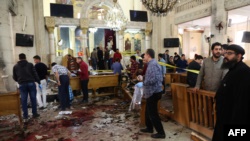Egypt to declare state of emergency after church bombings
| Publisher | Radio Free Europe/Radio Liberty |
| Publication Date | 9 April 2017 |
| Cite as | Radio Free Europe/Radio Liberty, Egypt to declare state of emergency after church bombings, 9 April 2017, available at: https://www.refworld.org/docid/5975a72113.html [accessed 4 November 2019] |
| Disclaimer | This is not a UNHCR publication. UNHCR is not responsible for, nor does it necessarily endorse, its content. Any views expressed are solely those of the author or publisher and do not necessarily reflect those of UNHCR, the United Nations or its Member States. |
Last Updated: April 09, 2017
 (WARNING: Graphic) People look at the aftermath following a bomb blast that struck worshipers gathering to celebrate Palm Sunday at the Mar Girgis Coptic Church in the Nile Delta city of Tanta, 120 kilometers north of Cairo, on April 9.
(WARNING: Graphic) People look at the aftermath following a bomb blast that struck worshipers gathering to celebrate Palm Sunday at the Mar Girgis Coptic Church in the Nile Delta city of Tanta, 120 kilometers north of Cairo, on April 9.
Egyptian President Abdel Fattah al-Sisi has said a three-month state of emergency will be imposed, after dozens of people were killed in bomb attacks on two churches
Sisi announced the measure, which is expected to be backed by parliament, in a speech after a meeting of the National Defense Council on April 9.
Earlier, the president ordered military units to "immediately deploy and assist the civilian police in securing vital facilities in all provinces of the republic," his office said.
The two bombings targeted Coptic Christians on Palm Sunday, one of the holiest days in the Christian calendar, killing at least 44 people and injuring more than 100, officials said.
The Islamic State (IS) extremist group claimed responsibility for the attacks, saying they were carried out by two militants wearing suicide vests, and warned of future attacks.
One bombing took place outside a church in Alexandria where Pope Tawadros II, head of the Coptic Church, was attending Mass, media reported. He was unhurt.
The blast occurred several hours after an explosion rocked another Coptic church in the city of Tanta in the Nile Delta.
The government announced three days of mourning.
Palm Sunday marks the triumphal entry of Jesus Christ into Jerusalem and the start of Holy Week for Christians.
Christians make up around 10 percent of Egypt's population and have repeatedly been targeted by Islamic extremists.
A bombing at Cairo's largest Coptic cathedral killed at least 25 people and wounded 49 in December.
After the latest attacks, Pope Francis, who is due to visit Egypt later this month, asked God "to convert the hearts of those who spread terror, violence, and death."
Grand Sheikh Ahmed el-Tayeb, head of Egypt's Al-Azhar, Sunni Islam's highest seat of learning, called the attacks a "despicable terrorist bombing that targeted the lives of innocents."
The UN Security Council condemned the "heinous" and "cowardly" bombings, while UN Secretary-General Antonio Guterres expressed hope that the perpetrators will be brought to justice.
The U.S. Department of State condemned in "the strongest terms the barbaric attacks" and said the United States will "continue to support Egypt's security and stability in its efforts to defeat terrorism."
With reporting by AFP, AP, dpa, and Reuters
Link to original story on RFE/RL website
